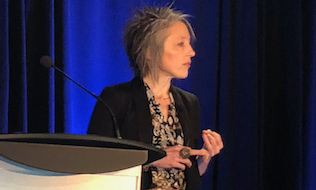

When Lisa Machado was diagnosed with a rare leukemia 11 years ago, one of her biggest challenges was finding emotional support and education.
“And so in the days after I was diagnosed, I joined the clinical trial, mostly because I was anxious and wanted to make sure that if anything happened, it would be watched very closely. . . . And I didn’t know how I was going to afford the $4,500 it was going to cost me every month for my medication,” said Machado, a former financial journalist and founder of the Canadian CML Network, during a session at Benefits Canada‘s Employers Cancer Care Summit in Toronto on Feb. 27.
Read: How to support employees with incurable cancers
Fortunately, Machado went into remission four months after starting treatment. “I was thrilled. I was also scared, anxious and worried about everything. I was worried about long-term effects of the medication. I was worried whether the medication was going to continue working. I was worried I was going to die. And for about a year, every appointment I had with my oncologist I would ask for a stem cell donor. And he would say, ‘Oh Lisa, you’re not going to need this, you know.'”
That conversation prompted Machado to found a group for those living with chronic myelogenous leukemia to see if other people experienced the same fear and anxiety she constantly lived with. At the first meeting, she “heard things like, ‘I feel so low. Nobody knows what it’s like to live with cancer. My boss doesn’t understand how tired I am.’ We heard some challenges about returning to work with cancer, and it was a life-changing moment for me. I finally had some validation about how I was feeling. And so the Canadian CML Network was born.”
All the gaps that currently exist in cancer support can be bridged by employers, said Machado. “You have the control to make a significant contribution in terms of improving outcomes for employees with cancer or living with cancer. We need nutritional programs, mental-health programs and access to benefits that allow us the medications we need.”
Read: Options for supporting employees in the return to work
She also noted the return to work experience for employees with cancer is crucial. “There’s a whole bunch of misinformation out there. It would be amazing in the workplace if there was a general cancer information [session] . . . to talk about the dialogues you can have with people diagnosed with cancer, or when they come back after cancer treatment.”
Cancer education in the workplace is great for a number of reasons, said Machado, noting it really helps the person who’s retuning to work ease back in without fear of misinformation and having to explain to colleagues what’s happened to them and how they feel.
Read more coverage from the 2019 Employers Cancer Care Summit.
